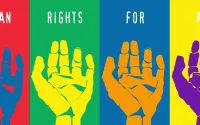Ehud Barak authorised the cuts, which are expected to follow immediately after rocket attacks are launched.
Palestinian leaders say the measure amounts to collective punishment.
Israel supplies 60% of the electricity for Gaza's 1.5 million inhabitants - but last month Israel declared Gaza a "hostile entity".
|
By formally declaring Gaza "hostile", Israel argues it is no longer bound by international l governing the administration of occupied territory to supply utilities to the civilian population.
But the position accepted by the international community is that Israel remains legally responsible for the coastal strip, despite withdrawing two years ago, because it still controls Gaza's borders, airspace and territorial waters.
Israel imposed an economic embargo on Gaza after the Islamist militant group, Hamas, seized control from the rival Fatah group in June. It is also limiting the movement of people in and out of the territory.
But the top United Nations humanitarian official has now urged Israel to lift its economic blockade of the Gaza Strip.
"I would appeal to Israel to relax these restrictions (and) to lift the economic blockade on Gaza," UN Deputy Secretary General John Holmes told journalists.
He said the number of humanitarian convoys entering the territory had halved to 1,500 in September from 3,000 in July.
"In term of famine, we are not there, but there is a serious humanitarian crisis," Mr Holmes said.
'No choice'
Mr Barak is authorised to implement the sanctions, but it is not clear when they will come into effect or whether he will seek the further approval of Prime Minister Ehud Olmert and the security cabinet.
Deputy Defence Minister Mata Vilnai, wholed the team which formulated the plan, said Israel would "dramatically reduce" the power it supplied to Gaza over a period of several weeks.
"We are left with no choice but to take these steps. I assume they will have an effect, even if not immediately," he told Israeli Army Radio.
"The recommendation is to start disconnecting gradually, without causing anything that could create a humanitarian problem, like hospitals."
 Qassam rockets are frequently fired from Gaza into southern Israel |
Officials said the electricity would be cut at first for 15 minutes after each rocket attack and then for longer and longer periods.
Gen Vilnai said he hoped the gradual disconnection would encourage Gazans to produce their own electricity and no longer be dependent on Israel.
It is unclear how big an effect the power cuts will have, since many buildings have back-up generators.
About 120 megawatts out of the 200 megawatts of electricity used annually in Gaza are bought from and supplied by Israel directly. A further 17 megawatts are supplied by Egypt, while 65 megawatts is produced by a power station in Gaza.
'Exploiting human needs'
A spokesman for Hamas in Gaza said it would be unbowed by any further sanctions.
"International law requires that occupation forces take care of the needs of the occupied peoples," Sami Abu Zuhri said.
"Exploiting human needs to blackmail our people will never weaken us." The Western-backed Palestinian Authority of President Mahmoud Abbas also reacted angrily to the plan.
"This decision is a form of collective punishment against our people in Gaza," Cabinet Secretary Saadi al-Kronz said in a statement.
The UN has previously warned Israel that it must not inflict collective punishment on Gaza's civilian population by cutting vital supplies and services.
In other developments on Thursday, two Palestinian militants were killed in a clash with Israeli troops in the southern Gaza Strip. The armed wing of the Hamas, the Izzedine al-Qassam Brigades, said the two men were its members.
Another Palestinian militant was later shot dead by Israeli troops in the northern Gaza Strip while he attempted to plant an explosive device near the border with Israel, the Israeli military said.
Islamic Jihad said one of its members had been killed, but insisted he had been unarmed.






